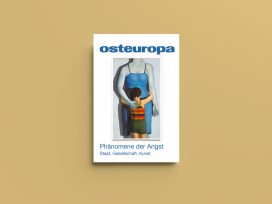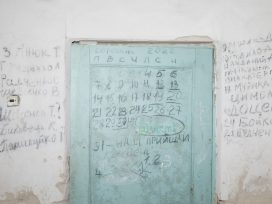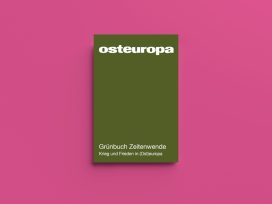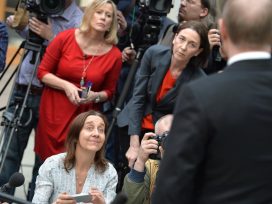In the age of mature Putinism, violence and control, accompanied by a new morality based on so-called ‘traditional values’, have become crucial instruments for managing Russian society. The use of the education system and cultural institutions to indoctrinate the population – above all young people – is a form of violence, only intellectual rather than physical.
In some respects, the scale of repression is greater now than in the late Soviet period. The absurdity of the accusations and even the number of convictions on political charges is increasingly reminiscent of the Stalin era. On 27 February 2024, for example, the human rights activist Oleg Orlov was jailed for actions allegedly motivated by ‘hatred of traditional values’. Ideology is acquiring a practical significance in the implementation of political repression.
The function of ideology and ideological agencies – from the Ministry of Education and communications watchdog Roskomnadzor to the prosecutor general’s office, the Ministry of Justice, the Investigative Committee and the Federal Security Service (FSB) – is to present a single vision of the world and to punish anything that refutes or contradicts it. All of these agencies are becoming mechanisms for controlling ideology and culture.
The first decree that Russian President Vladimir Putin signed after his fifth inauguration in May 2024 was ‘On the Approval of the Fundamentals of State Policy of the Russian Federation in the Field of Historical Education’. According to the decree, which serves as the foundation of the state ideology and a blueprint for the indoctrination of the population, everything is to be unified within the framework of ‘historical education’: a consolidated instructional methodology for all education levels starting with kindergarten, and of course a ‘unified state line of history textbooks’.
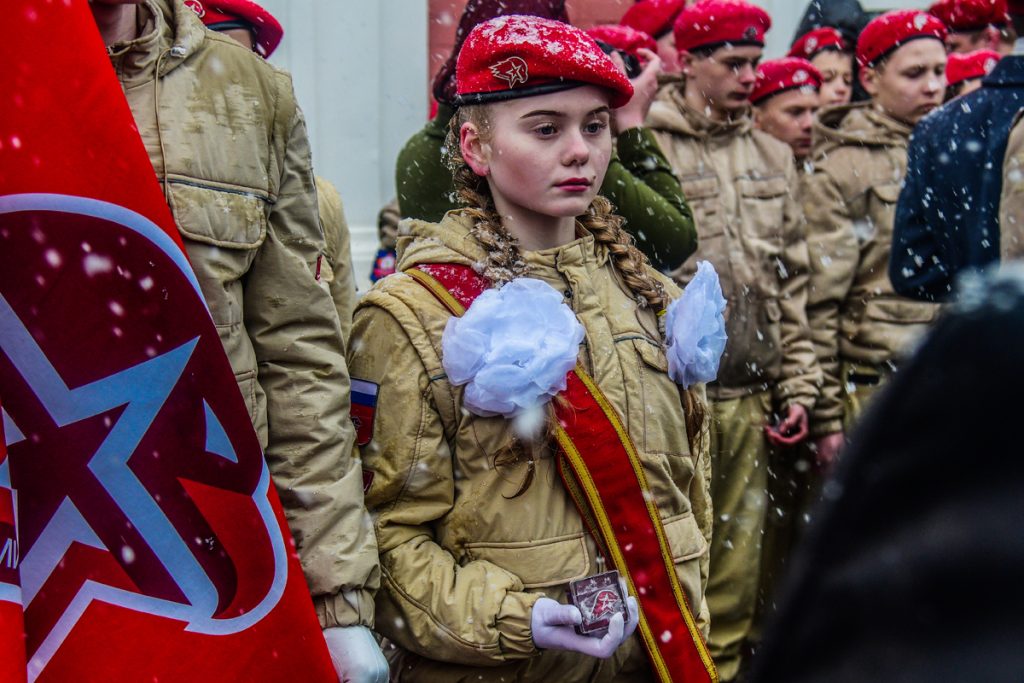
Members of the Young Army, Nizhny Novgorod 2019. Author: Mil.ru / Source: Wikimedia Commons
This approach is symptomatic of the manipulation of national consciousness. The state seeks to corral all of society into professional, gender-based, generational or other ‘thematic’ cells, forming corporatist structures. A society that has been systematized in this fashion is easier to control and to indoctrinate.
Young people are one of the most important ‘corporations’ for the Putin regime. Support for Putin and his initiatives is lowest in this age category and the Putin system – like any authoritarian or totalitarian regime – sees young people as a key source of obedient human resources. This is why the state has become so involved at all levels of education, from primary schools to colleges and universities. The practices of ‘patriotic’ education are becoming more and more intrusive, simplistic and cliched.
Fires everywhere
In the autumn of 2023, a course was introduced at universities entitled ‘Foundations of Russian Statehood’. Unified history textbooks were also published for the upper grades of secondary school for the 2023–2024 school year. But many ultra-conservative and militarist ideologists doubt that these are sufficient to convert pupils to a single ideological faith. Alexander Dugin, the ultraconservative head of the Ivan Ilyin Higher Political School (IIHPS) at the Russian State University for the Humanities, accuses the majority of educational institutions in Russia of reflecting the liberal order of the 1980s–1990s. ‘What is necessary,’ he argues, ‘is the militarization of education, a sharp break in the vector – above all in the humanities – that has been established in recent decades under the direct control and at the orders of the West, with which we are at war today.’
On 3 April 2024, Andrei Ilnitsky, an advisor to the defence minister, visited Russia’s leading physics and mathematics university, the Moscow Institute of Physics and Technology (MIPT), and gave a lecture as part of a course on ‘processes in the world community’. According to attendees, he told the students that ‘plans are being hatched on the other side of Russia’s borders to sow chaos, undermine sovereignty, and jeopardize history, traditions, values, convictions, and ideology’. There were no protests at MIPT, but the students saw the lecture as an attempt to impose an obscurantic worldview at an institution whose graduates often emigrate from Russia because they do not see a place for themselves in a militarized state and society. The alumni, faculty, and students of this university spoke out against the so-called ‘special military operation’ right after it began. In early March 2022, almost 3,000 people signed a petition against the invasion: a significant number for an elite institution.
Two years later, in April 2024, more than 5,000 people signed a student petition against the establishment of the Dugin-led IIHPS at the Russian State University for the Humanities. When news of the petition began to spread, the number of signatures reached more than 25,000 in a matter of days as people outside the university’s student body, and even those who had no connection with the institution, began to sign it. The response from the university’s rector and from Dugin himself was predictable and in line with current political mores in Russia: they speculated that the petition had been orchestrated by pro-Ukrainian forces, ‘foreign agents’ and supporters of ‘unfriendly countries’, all representing a minority view.
It is important for the state to sustain the majority effect: the regime and its propaganda units try hard to make it look as if Russian society – with the exception of unconscientious citizens and those painted as ‘fifth columnists’ – is united in its support of Putin and his war. In particular, this support is supposed to be expressed by the 87 percent vote in favour of the ‘eternal leader’ in the presidential ‘elections’. In such a situation, the minority view is only held by outcasts, and the only sensible strategy for them is to join the majority (even if disingenuously, like the passive conformists who actually make up the sociological majority of the population).
However, civil society is still alive, despite the atmosphere of fear, direct repression and professional purges in the education sector. This above all the case in higher education – and particularly at the Higher School of Economics (HSE), which until recently was Russia’s most liberal big university. Civil society is not fighting for power, it is putting up moral resistance, as it did in the last decades of the Soviet Union. The students’ actions are manifestations of this moral resistance to the system.
Incubators for the new human
As it matures, any totalitarian regime hits upon the idea of forming a new kind of human. This new human becomes the model for the labour market and the well-paid professions of the security service official (silovik) or military-industrial complex employee. The ‘special military operation’ is the best career ladder for Putinists. This is how all totalitarian regimes were built: from the Stalin regime, which co-opted the entire Soviet population into youth, party, and trade union organizations, to the regime of Benito Mussolini in Italy and that of António Salazar in Portugal.
In all regimes of this type, the ideology is founded on the concept of a special path resulting from a glorious history. A totalitarian state views itself as ‘the people’s’ and claims the right to mobilize the nation. In turn, the nation defines itself in the terminology of a special unity, such as the ‘new historical commonality’ in the USSR, Deutschtum in Germany, and corresponding concepts of Italianità in Italy and Hispanidad in Spain. If the state is involved in a war, then there is a cult of the fallen and of heroic death. Take, for example, ‘Let’s Rise!’, a song by the popular Russian national-patriotic singer Shaman:
Let’s rise, as long as God and the truth are on our side,
We’ll say thanks for granting us victory.
For those who found their heaven and are no longer with us,
Let’s rise and sing a song.
The subject matter and lyrics differ little from those found in Stalinist marching songs, the National Socialist ‘Horst Wessel Lied’, the Spanish legion march ‘El Novio de la Muerte’ (‘Bridegroom of Death’), and the official hymn of the Italian fascist party, ‘Giovinezza’ (‘Youth’). The unity of the people and the leader is one of the fundamental components of ideology in totalitarian regimes. And the strength of a nation is measured by its ability to function in economic isolation and as a political autarchy.
Corporate cells are the organizational basis of such systems. Ideally, a network of these cells covers the entirety of public space. The organizations of the Soviet Union – the Little Octobrists, Pioneers, Komsomol, and the various trade unions – were modelled after those of their own enemies: the fascist and ultra-right regimes of the twentieth century. The Little Octobrists and the Pioneers had a lot in common with the Italian youth organization Balilla, above all the didactic examples of child heroes.
Still, current Russian practices are not entirely totalitarian, although they lean towards it: the smiling, uniformly clad young creatures on posters are victims of semi-totalitarian practices, since they do not represent all young people.
For now, the regime has not been able to incorporate all young people into its modern-day youth movements, including Movement of the First, Young Army and the I’m Proud association of student clubs. The state doesn’t require all students – or at least all members of student councils – to join pro-Kremlin movements, and this distinguishes classic totalitarianism from Putin neo-totalitarianism.
For a semi-totalitarian (or neo-totalitarian) regime, patriotism primarily means the militarization of consciousness. Young Army, for example, was established two years after the annexation of Crimea, when the regime had already begun to transform from a purely authoritarian regime into a semi-totalitarian one.
Naturally, a militarized organization must represent the struggle between all that is good and all that is bad. This is why the mission of the organization, as stated on its website, is ‘to cultivate in Young Army members kindness, compassion, conscientiousness, loyalty, dignity and love for their Motherland’. Young Army, its mission statement continues ‘is dedicated to fostering respect for the institution of family, for the memory of the ancestors, and for elders’.
The start of the ‘special military operation’ sharply accelerated the formation of the state ideology and the organizations tasked with spreading it – including to young people. Established in 2022, the Movement of the First is a successor to the Soviet Pioneers, although the age range of the new organization is much wider: from six to 25, compared to nine to 14.
Boys and girls who ‘follow the traditions of our ancestors’ are a natural element of a movement for an ideology that sees its bright future in a dark past. The movement’s key characteristics appeal to a glorious history built on a negative identity; they hint at an enemy that undermines the pursuit of a unique historical path. According to the organisation’s mission statement, ‘members of the Movement study know and protect the history of Russia, oppose any attempts to distort and denigrate it. They preserve the memory of the defenders of the Fatherland’. Family values that are ‘uniquely’ traditional – apparently unlike other countries and peoples – are a crucial aspect of self-identification: ‘Members of the Movement share traditional family values. They are proud of the Russian culture of fatherhood and motherhood. They honour large families. They help younger children, take care of grandparents in the family’.
Ceremonies and rituals
Indoctrination at school level is easy to carry out, because the state is free to do whatever it wants: from mandating unified history textbooks to holding ‘Conversations About Important Things’ as the first class on Mondays. The website of the ‘Conversations’ programme contains thematic and methodological materials, frequently pegged to specific dates. Every topic is developed by a speaker specializing in the subject, often with the use of strange and laboured texts. For example, the lesson on ‘Crimea and Sevastopol: Ten Years in Their Native Harbour’ (a phrase that has become a propaganda cliché) is given by Metropolitan Tikhon, often referred to as Putin’s confessor. His book Death of an Empire (described in its blurb as a work ‘about the mechanisms of cataclysms in Russia’) has become another ideological weapon for the regime.
A special ‘wooden language’ (social dialect) for talking about ‘values’ is being developed as part of the increasingly symbiotic relationship between schools and the Movement of the First. This has also always been typical for totalitarian regimes. Additionally, indoctrination is cemented by ceremony (in particular, the raising of the flag in schools) and ritual, as well as initiatives like ‘Letter to a Soldier’, where pupils are supposed to congratulate the participants of the current conflict on the 9 May Victory Day holiday. ‘Letter to a Soldier’ is designed to create the impression of continuity between World War II and the ‘special military operation’, though no one seems to care that the people of Ukraine are just as entitled to celebrate victory over Hitler’s Germany in World War II.
There is also a mandatory (or at least strongly encouraged) campaign at all types of educational establishments throughout the country to make handmade supplies for the war. These efforts have been elevated to the status of an important common cause. In the spring of 2024, for example, the Minister of Education and Science of Dagestan, Yahya Buchayev, instructed schools to teach students to weave camouflage nets and make ‘trench candles’ as part of their extracurricular programmes.
Blacked-out pages
The process of censorship and self-censorship at publishing houses and bookstores has spread to the literature curriculum in schools, including supplementary reading lists. However, this is only part of the overall picture of what is happening on the general book market, especially since reading lists (and lists of books not recommended for reading) include many non-children’s books.
On the general book market, an ‘expert centre’ has been established to assess whether print and electronic editions correspond to laws and norms, above all those that prohibit ‘LGBTQ propaganda’. A censorship agency has been established as a complement to denunciations and the efforts of law-enforcement agencies. This is not censorship preventing publication, but rather retroactive inspections of books that have already been published, sometimes as a result of warnings by the prosecutor’s office.
There is also another approach to censorship. For example, the Russian translation of Roberto Carnero’s biography of the gay Italian filmmaker Pier Paolo Pasolini (Pasolini. Dying for Ideas), which went on sale in May 2024, has been physically redacted, with fragments related to Pasolini’s sexuality blacked out.
Another important and telling example was an initiative by State Duma deputies to amend a law on library services in order to prohibit the lending of books by ‘foreign agents’, ‘terrorists’, and ‘extremists’. Of course, many libraries and bookstores have already stopped lending and selling books by ‘foreign agents’ in the spirit of preventive conformism. Some publishing houses have also stopped signing contracts with authors who have been declared ‘foreign agents’, fearing that they might have difficulty selling books by these authors or get in trouble themselves.
There have also been changes to school curricula. Some books that had been integral to shaping the identity of the Soviet individual, such as Alexander Fadeyev’s The Young Guard and Nikolai Ostrovsky’s How the Steel Was Tempered, have been brought back from what now seems an archaic past. Some anti-Soviet (and primarily anti-Stalin) books are still on the reading list, such as Alexander Solzhenitsyn’s The Gulag Archipelago and One Day in the Life of Ivan Denisovich. Others have been struck from it, including Georgy Vladimov’s Faithful Ruslan, Varlam Shalamov’s Kolyma Tales, and Yuri Trifonov’s The House on the Embankment.
Literature is becoming as ideological a subject as history, which is already an instrument of indoctrination in schools. An April 2024 decree issued by the Ministry of Education significantly increased the number of classroom hours allocated for the teaching of history. Under different circumstances this could be a welcome development – but not at a time of ‘unified’ textbooks and the politicization and mythologization of history. Naturally, a lot still depends on the individual teacher, as was the case in the Soviet Union. However, the system itself is putting pressure on teachers, even the best of whom are being forced to adapt to the proposed political circumstances – along with, of course, the pupils.
The same decree drastically reduced the number of classroom hours for social studies: the subject has simply been eliminated in grades six to eight. Perhaps this is because reality now sits in catastrophic contradiction with the democratic, constitutional foundations of Russian statehood and the constitutionally protected rights and freedoms of the country’s citizens.
But Yana Lantratova, a State Duma deputy, explained the changes in the social studies curriculum as follows: ‘If you look at the concepts being studied at this period of time, these are primarily western concepts, which say that a society that respects religion, large families and traditional values is a backward society, and that the only ideal model is the American model.’
Special anthropological operation
It is still possible to resist this oppression by ignoring it or pretending to conform to its rules. However, the state is increasingly saturating everyday life with propaganda and ideology. For example, St. Petersburg Governor Alexander Beglov has promised to rename the city’s schools after participants of the ‘special military operation’.
The Putin regime now seems to be eternal, and for that reason many Russians now coming of age find it natural to make use of the career lifts offered by the state. The requirements for using these lifts include political loyalty, a belief in mythologized narratives, and a defence-oriented consciousness.
While the nationalization of the individual (as well as of property) is in full swing in Russia, it is yet to be completed. This is an escalating ‘special anthropological operation’ in which intellectual violence has enormous significance.
Civil society has not yet lost the anthropological battle for the hearts and minds of Russians, particularly when it comes to the young. The state will not stop at what it has achieved so far, but nor will society abandon its fight to protect human dignity. A protracted domestic war of attrition lies ahead – one whose ultimate outcome is hard to predict.
This article was published in Letras Libres as part of Conversaciones Globales, a project supported by Open Society Foundations.




